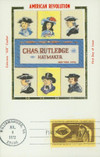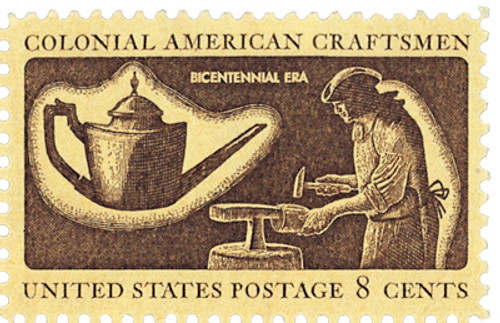
1972 8c Colonial American Craftsmen: Wigmaker
# 1458 - 1972 8c Colonial American Craftsmen: Wigmaker
$0.35 - $10.00
U.S. #1458
8¢ Wigmaker
Colonial Craftsmen Issue
Bicentennial Series
Colonial Craftsmen Issue
Bicentennial Series
Issue Date: July 4, 1972
City: Williamsburg, VA
Quantity: 50,472,500
Printed By: Bureau of Engraving and Printing
Printing Method: Engraved
Perforations: 11 x 10 ½
Color: Deep brown and dull yellow
This stamp is part of a group of four se-tenant stamps issued as part of the American Revolution Bicentennial Series and depicts colonial craftsmen working at their trade. Glassblowing is regarded as the colonial craft (Jamestown, 1608). Silversmithing began in Boston in the 1600s, and wigmaking began domestically around 1700. In 1660, hatmaking began in Virginia. The hatter on this issue is rolling a beaver hat.
The Bicentennial Series
The U.S. Bicentennial was a series of celebrations during the mid-1970s that commemorated the historic events leading to America’s independence from Great Britain. The official events began on April 1, 1975, when the American Freedom Train departed Delaware to begin a 21-month, 25,338-mile tour of the 48 contiguous states. For more than a year, a wave of patriotism swept the nation as elaborate firework displays lit up skies across the U.S., an international fleet of tall-mast sailing ships gathered in New York City and Boston, and Queen Elizabeth made a state visit. The celebration culminated on July 4, 1976, with the 200th anniversary of the adoption of the Declaration of Independence.
The U.S.P.S. issued 113 commemorative stamps over a six-year period in honor of the U.S. bicentennial, beginning with the American Revolution Bicentennial Commission Emblem stamp (U.S. #1432). As a group, the Bicentennial Series chronicles one of our nation’s most important chapters, and remembers the events and patriots who made the U.S. a world model for liberty.
U.S. #1458
8¢ Wigmaker
Colonial Craftsmen Issue
Bicentennial Series
Colonial Craftsmen Issue
Bicentennial Series
Issue Date: July 4, 1972
City: Williamsburg, VA
Quantity: 50,472,500
Printed By: Bureau of Engraving and Printing
Printing Method: Engraved
Perforations: 11 x 10 ½
Color: Deep brown and dull yellow
This stamp is part of a group of four se-tenant stamps issued as part of the American Revolution Bicentennial Series and depicts colonial craftsmen working at their trade. Glassblowing is regarded as the colonial craft (Jamestown, 1608). Silversmithing began in Boston in the 1600s, and wigmaking began domestically around 1700. In 1660, hatmaking began in Virginia. The hatter on this issue is rolling a beaver hat.
The Bicentennial Series
The U.S. Bicentennial was a series of celebrations during the mid-1970s that commemorated the historic events leading to America’s independence from Great Britain. The official events began on April 1, 1975, when the American Freedom Train departed Delaware to begin a 21-month, 25,338-mile tour of the 48 contiguous states. For more than a year, a wave of patriotism swept the nation as elaborate firework displays lit up skies across the U.S., an international fleet of tall-mast sailing ships gathered in New York City and Boston, and Queen Elizabeth made a state visit. The celebration culminated on July 4, 1976, with the 200th anniversary of the adoption of the Declaration of Independence.
The U.S.P.S. issued 113 commemorative stamps over a six-year period in honor of the U.S. bicentennial, beginning with the American Revolution Bicentennial Commission Emblem stamp (U.S. #1432). As a group, the Bicentennial Series chronicles one of our nation’s most important chapters, and remembers the events and patriots who made the U.S. a world model for liberty.












